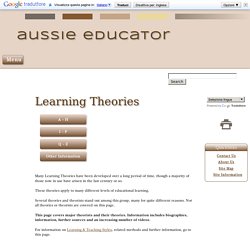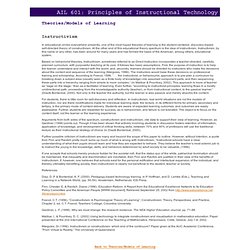

Welcome to CCK11 ~ Connectivism MOOC. Connectivism and Connective Knowledge. Creating Constructivist Learning Environments on the Web: The Challenge in Higher Education. Constructivism as a Paradigm for Teaching and Learning. What is constructivism?

How does this theory differ from traditional ideas about teaching and learning? What does constructivism have to do with my classroom? Expert interview What is the history of constructivism, and how has it changed over time? What are some critical perspectives? What are the benefits of constructivism? What is constructivism? Constructivism is basically a theory -- based on observation and scientific study -- about how people learn. In the classroom, the constructivist view of learning can point towards a number of different teaching practices. Constructivist teachers encourage students to constantly assess how the activity is helping them gain understanding.
You might look at it as a spiral. For example: Groups of students in a science class are discussing a problem in physics. Contrary to criticisms by some (conservative/traditional) educators, constructivism does not dismiss the active role of the teacher or the value of expert knowledge. A Conversational Framework for Instruction. Rethinking Teaching for the Knowledge Society. Mobile_C6_Laurillard.pdf. Rethinking Uni Edn - Laurillard. Diana Laurillard. Recent publications Laurillard, Diana (2013), Supporting Teachers in Optimizing Technologies for Open Learning in J.

Willems, B. Tynan, and R. James (Eds), Global Challenges and Perspectives in Blended and Distance Learning, Information Science Reference, Hershey, PA. Diana Laurillard (2012). Review in Teachers College Record at Laurillard, D., P. Charlton,P., Magoulas, G., & Diana Laurillard, D. (2012): Enabling creative learning design through semantic technologies, Technology, Pedagogy and Education, 21:2, 231-253. Thomas, M. Frederickson, N., Laurillard, D., Tolmie, A.
Brian Butterworth, Sashank Varma, and Diana Laurillard (2011) Dyscalculia: From Brain to Education, Science, Vol. 332 no.6033 pp. 1049-1053 (2011). Laurillard, D and Ljubojevic, D. (2011) . (2010) . (2009) The pedagogical challenges to collaborative technologies, International Journal of Computer-Supported Collaborative Learning, 4(1) 5-20. (2008) . (2007). Powerpoint presentations laurillard-inaugural-20080226. YouTube. Instructivism to Constructivism. Instructivism & Constructivism. Education Theorists. Many Learning Theories have been developed over a long period of time, though a majority of those now in use have arisen in the last century or so.

These theories apply to many different levels of educational learning. Several theories and theorists stand out among this group, many for quite different reasons. Not all theories or theorists are covered on this page. This page covers major theorists and their theories. Information includes biographies, information, further sources and an increasing number of videos. For information on Learning & Teaching Styles, related methods and further information, go to this page. Bandura, Albert Bandura and his Social Cognitive Theory. Albert BanduraText presentation on the man and his theories. Bloom’s Taxonomy Benjamin BloomThe man and his works. Constructivism Constructivism and the Five E’sBrief rundown then goes to seven E’s. De Bono, Edward Edward De Bono and lateral & creative thinking. Critical Thinking ResourcesTertiary level. Education Theory Capture Part 1. Principles of Instructional Technology.
Instructivism In educational circles everywhere presently, one of the most hyped theories of learning is the student-centered, discovery-based, self-directed theory of constructivism.

At the other end of this educational theory spectrum is the idea of instructivism. Instructivism, by this name or any other, has been around for many years and has formed the basis of the American, among others, educational system. Based on behaviorist theories, Instructivism, sometimes referred to as Direct Instruction incorporates a teacher-directed, carefully planned curriculum, with purposeful teaching at its core. It follows two basic assumptions. For students, there is little room for self-discovery and reflection. Arguments from both sides of the spectrum, constructivism and instructivism, cite data to support their view of learning.
Further possible criticism of instructivism are many and beyond the scope of this paper to outline. References.